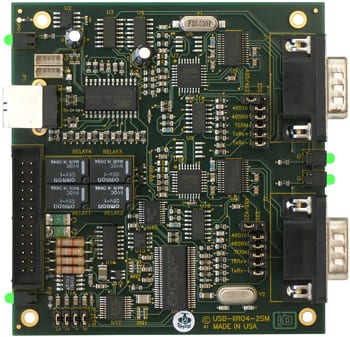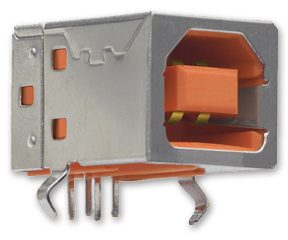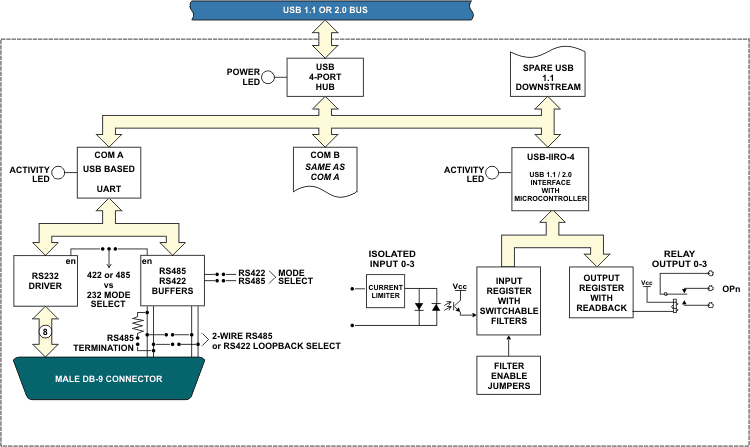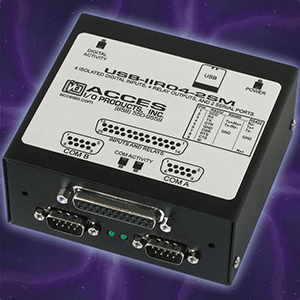USB-IIRO4-2SM: USB Isolated I/O and Serial Communication Modules
Features
- Multifunction I/O board with isolated digital I/O and serial communication
- High-speed USB 2.0 device, USB 3.0 and 1.1 compatible
- Four optically isolated digital inputs
- Four Form C electromechanical 1A relays
- Two serial ports, field selectable RS-232/422/485
- Small (4″x4″X1.8″) rugged industrial enclosure
- PC/104 module size and mounting compatibility
- All required power drawn from USB port, no external power adapter required
- Expansion USB hub port connector
- Type B USB connector features industrial strength and high-retention design
- Now with Firmware 2.0 features!
- Onboard Watchdog Timer, configurable power-on defaults, digital input debouncing and latching, digital output Pulse Width Modulation (PWM) and Matrix Mapping
Factory Options:
- Four digital input/output version (USB-IIRO-4DB)
- Two serial ports only version (USB-COM-2SM)
- OEM (board only) version with PC/104 mounting holes and PCB footprint for added flexibility in embedded applications
- DIN rail mounting for industrial environments
- RoHS compliant version.
- Please contact us for ordering information
$219.00 – $279.00
In StockDescription
The USB-IIRO4-2SM is a USB multifunction device, incorporating a USB 4-port hub internally to provide four optically isolated digital inputs, four electromechanical relay outputs and two ports of RS-232/422/485 serial communication in one small product. The digital portion is ideal for adding easy-to-install isolated input and relay output capabilities to any PC or embedded system with a USB port. This single USB multifunction device is ideal for a variety of applications such as industrial monitoring, control and communication.
DIGITAL
The isolated, non-polarized inputs may be driven by either DC sources of 3-31 V (or higher by special order) or AC sources at frequencies of 40Hz to 10kHz. Optically isolating the digital inputs from each other, and from the computer, assures smooth, error-free data transmission in noisy, real-world environments. The relay outputs are de-energized at power-up to prevent an unintended control output signal. Data to the relays is latched. The relay contacts and isolated inputs are available via a mounted DB25 connector or, for OEMs, a 26-pin IDC type vertical keyed shrouded header. For testing purposes and low current applications 5VDC and ground pins are provided on the same connector. The digital portion of the USB-IIRO4-2SM is excellent in applications where only a few on-board relays are required and a small number of inputs must be isolated such as in test equipment, instrumentation and process control.
SERIAL
The serial section is a two-port asynchronous serial communication adapter designed for use with any computer system equipped with a USB port. Multiple peripherals such as POS, barcode scanners, scales, date-entry terminals, data acquisition modules, and automation equipment can now be recognized and used on a single USB port. Simply install the included software and connect the unit to your USB port. It instantly provides two RS-232, RS-422, or RS-485 serial ports which can be selected on a port by port basis. It is now easier than ever to add serial ports and serial devices to any application along with easy plug-and-play and hot-swapping features.
Type FT232 UARTs are used as asynchronous communication elements. This includes 384-byte receive / 128-byte transmit FIFO buffers for high data throughput and to protect against lost data in multitasking systems. Crystal oscillators located on the card permit precise baud rate capability up to 230.4K for use in RS-232 mode, using ICL3243 type drivers. Speeds up to 921.6K are achievable using RS-422 & RS-485. The driver/receivers used are type SP491 which are capable of driving long communication lines at high baud rates. They can drive up to ±60 mA on balanced lines and receive inputs as low as 200 mV differential signal superimposed on common mode noise of +12V to -7V. In case of communication conflict, the driver/receivers feature thermal shutdown. The serial communications are conveniently provided through two DB9 board mounted male connectors with adjacent LEDs indicating serial port activity.
ENCLOSURE
The USB-IIRO4-2SM includes a rugged steel enclosure with attractive powder coat finish and anti-skid bottom. The unit enclosure is 4 inches wide by 4 inches deep by 1.8 inches high. The adapter is supplied with a 6 foot USB cable. In addition to the two serial LEDs the unit features two additional easy-to-read LEDs indicating digital I/O enabled/ready and USB power. Port protocol is configured by opening the enclosure and configuring jumpers on the circuit board. It is fully compatible with both USB 1.1 and USB 2.0 ports. The OEM version provides just the board without the enclosure and is ideal for a variety of embedded OEM applications.
Firmware 2.0 Features
Onboard Watchdog Timer. If your application fails to communicate with the device within a specified timeout period (up to hundreds of seconds) the onboard intelligence will change all the output ports and values to the configured “safe” state.
Need a DAC to power up at 1 Volt? Want the digital output port to generate a square wave as soon as the firmware is loaded? Now you can configure the power-on default states for all possible outputs.
Command the onboard intelligence to perform digital input debouncing and latching. Debouncing time constants from hundreds of microseconds to hundreds of milliseconds allows a wide variety of low-pass filtering options. Latching inputs record low- and high-going pulses that your application may otherwise have missed.
PWM allows programmable duty-cycle square wave output on any digital output. MAP is our new Matrix Mapping feature, wherein you can command the onboard intelligence to automagically copy the state of one bit onto another bit, with no computer interaction required.

OEM USB/104 FORM FACTOR
What makes the OEM option unique is that its PCB size and mounting holes match the PC/104 form factor (without the bus connections). This allows our rugged digital/serial board to be added to any PCI-104 or PC/104 stack by connecting it to a simple USB port usually included on-board with embedded CPU form factors such as EBX, EPIC, and PC/104 – especially important since many newer CPU chipsets do not support ISA and have plenty of USB ports. Future stacks will be using the extremely fast PCI Express bus which is essentially overkill for simple digital monitoring and control. The USB-IIRO4-2SM OEM board can also be added into many pre-existing standard PC/104 based systems and enclosures.
High Retention USB Connector
 The ever-growing presence of USB in the industrial/military marketplace has driven the need for USB connections to be reliable, dependable, and unfailing. Gone are the days of loose USB connections. A type B USB connector is used on all ACCES USB/104 products which features a high retention design that complies with the class 1, Div II minimum withdrawal requirement of over 3 pounds of force (15 Newtons). This connector has an orange color-coded insulator to quickly differentiate it from standard USB connectors. Using these USB connectors increases reliability in your system and ensures a tight connection. For embedded OEM type applications, an additional miniature USB input header is provided in parallel with the type B connector.
The ever-growing presence of USB in the industrial/military marketplace has driven the need for USB connections to be reliable, dependable, and unfailing. Gone are the days of loose USB connections. A type B USB connector is used on all ACCES USB/104 products which features a high retention design that complies with the class 1, Div II minimum withdrawal requirement of over 3 pounds of force (15 Newtons). This connector has an orange color-coded insulator to quickly differentiate it from standard USB connectors. Using these USB connectors increases reliability in your system and ensures a tight connection. For embedded OEM type applications, an additional miniature USB input header is provided in parallel with the type B connector.
APPLICATIONS
The industrial I/O market commonly uses electromechanical Form C relays due to their robustness and ability to withstand unexpected surge currents allowing for increased flexibility in switching capability. These relays are also used where small reed relays are inadequate due to their susceptibility to contact damage. The USB-IIRO4-2SM with its tiny enclosure and easy connectivity provides portable connections to laptops for this kind of monitoring and control for the mobile test market. The full USB-IIRO4-2SM unit can be used in the following markets.
- Home
- Portable and laptop
- Education
- Industrial Automation and Control
- Embedded OEM
- Point of Sale (POS) Retail
- Data Acquisition
- Serial Instrumentation
- Laboratory Research
- Remote Access
FACTORY OPTIONS
- Four digital input/output version (USB-IIRO-4DB) available
- Two serial ports only version
- OEM (board only) version with PC/104 mounting holes and PCB footprint for added flexibility in embedded applications
- DIN rail mounting for industrial environments
- RoHS Available. Please contact us for ordering information
ACCESSORIES
The USB-IIRO4-2SM is available with optional cable assemblies, screw termination boards and DIN rail mounting provisions.
Downloads
Data Sheets
Manuals
Software
- USB-IIRO4-2SM Software Package (29.33 MB -- Last Uploaded 2024-01-17)
- LabVIEW Software Packages
- Linux Software Packages
Drivers and Downloads
Full list of available Downloads: Software Packages, Drivers, Manuals, and other documents
Information about our Free Software packages:
ACCES is proud to provide a full suite of software support with every Data Acquisition product. We are committed to supporting the most popular operating systems and platforms for our customers. Currently we are actively supporting XP -> 10, both 32 & 64 bit, including “Server 2008,” “Embedded,” and “Compact” flavors for all plug-and-play products including PCI, PCI Express, USB, and more. Many products continue to ship with support for additional operating systems such as DOS, Windows 95, 98, Me, NT4, and 2000.
Samples
Among the software we deliver with our products are sample programs in a wide variety of programming languages. These samples are used to demonstrate the software interfaces to our products — and many can be used as-is in your production environments, or to test functionality of the devices out-of-the-box. We’re currently actively supporting sample programs in Microsoft Visual C#, Visual Basic, Delphi, and Visual C/C++, with many devices including samples in Borland C/C++ 3.1 for DOS. Additionally we provide National Instruments LabVIEW compatible DLLs and many demonstration VIs for our devices.
Drivers
Drivers for various operating systems are also provided, including active support for Windows XP -> 10 — all in both 32-bit and 64-bit flavors, and including consumer, server, and embedded varieties — as well as the 2.6 and newer Linux kernels and recent OSX / macOS versions. Many products continue to ship with driver support for Windows 95, 98, Me, NT4, and Windows 2000, but support for these operating systems is considered deprecated.
Setup Programs and Utilites
Our Data Acquisition devices also include a graphical setup utility that walks you through the process of configuring any option jumpers or switches on the device, as well as explaining a little about the various connectors present.
Many devices also include utility programs – little tools to make your use of the device easier, such as EWriter, a program that allows you to read and write data in the user-accessible EEPROM locations on all our USB data acquisitition products; or WinRISC, a “Really Incredibly Simple Communications” terminal program that lets you get started instantly with serial devices.
“Register Level” Documentation
Besides all this software in all these languages and operating systems ACCES has a policy of open and transparent development: none of our lowest-level “register” interfaces are hidden from you — we document every register in every bus card, every command in every serial board, and every usb control transfer in every USB Data Acquisition board. These lowest-level interfaces allow you to develop for our products in ANY operating system or language, regardless of our actively supporting it or having a driver for it. We have customers actively developing in ADA, Android, Python, Java, MATLAB, Solaris, and more, just by referring to our complete low-level interface documentation! And we provide the full source code to all of our drivers, regardless of operating system, to give you an even bigger head start in your own development tasks.
No Fees or Royalties
All of this software is provided at no additional charge, and is licensed under any of a variety of flexible — and royalty free — options. Check out our software license explanation if you’d like more information.
USB and Performance
Our USB Data Acquisition products use our “AIOUSB” driver package in Windows and Linux. This driver package includes 32-bit and 64-bit support, and consists of low-level driver components and a high-level API library. This custom interface driver enables our USB devices to achieve 4000 transactions per second, compared to the competitions’ “HID” drivers that cap out around 50 transactions per second. You can read all about the API in the USB Software Reference Manual linked below, and included in every applicable Software Package. (The Linux version of the AIOUSB API is almost identical to the Windows API, and is documented in the aiousb.html file included in the Linux software package.) Like all of our software, full source code is always provided.
Custom Software
ACCES also offers Custom Software Services for our products. Our prices are unbelievably low, often as inexpensive as free! If you need something tweaked to support your needs, or an entire enterprise application developed from scratch, it is definitely worth your time to inquire with us, first.
Further information about available ACCES Software:
Redistributing Windows Drivers
A list of ACCES drivers and the files that compose them under different versions of Windows, so you can easily redistribute ACCES cards and drivers.

IIRO Connector Pin Assignments
| Pin # | Signal Name | Pin # | Signal Name | |
|---|---|---|---|---|
| 1 | Input 0 A | 14 | Relay 0 NO | |
| 2 | Input 0 B | 15 | Relay 0 Common | |
| 3 | Input 1 A | 16 | Relay 0 NC | |
| 4 | Input 1 B | 17 | Relay 1 NO | |
| 5 | Input 2 A | 18 | Relay 1 Common | |
| 6 | Input 2 B | 19 | Relay 1 NC | |
| 7 | Input 3 A | 20 | Relay 2 NO | |
| 8 | Input 3 B | 21 | Relay 2 Common | |
| 9 | Ground | 22 | Relay 2 NC | |
| 10 | Ground | 23 | Relay 3 NO | |
| 11 | + 5 V | 24 | Relay 3 Common | |
| 12 | + 5 V | 25 | Relay 3 NC | |
| 13 | No Connect | 26 | No Connect |
Serial Connector Pin Assignments
| DB-9 Male Pin for each of Ch A-G |
RS-232 Signals (Industry Standard) |
RS-485 Signals (2 Wire) |
RS-422 Signals (Also 4wire RS485) |
|---|---|---|---|
| Ch x – 1 | DCD | RX-/TX- | RX- |
| Ch x – 2 | RX | TX+/RX+ | TX+ |
| Ch x – 3 | TX | TX-/RX- | TX- |
| Ch x – 4 | DTR | ||
| Ch x – 5 | Gnd | Gnd | Gnd |
| Ch x – 6 | DSR | ||
| Ch x – 7 | RTS | ||
| Ch x – 8 | CTS | ||
| Ch x – 9 | RI | RX+/TX+ | RX+ |
Digital Specifications
Isolated Inputs
- Number of inputs: 4
- Type: Non-polarized, optically isolated from each other and from the computer (CMOS compatible)
- Voltage Range: 3 to 31 DC or AC Rms (40 to 10000 Hz)
- Isolation: 500V*(see note) channel-to-ground or channel-to channel
- Input Resistance: 1.8K ohms in series with opto coupler
- Filter Response Times: Rise Time = 4.7 mS / Fall Time = 4.7 mS
- Non-Filter Response Times: Rise Time = 10 uS / Fall Time = 30 uS
*Notes on Isolation:
Opto-Isolators and connectors are rated for at least 500V, but isolation voltage breakdowns will vary and is affected by factors like cabling, spacing of pins, spacing between traces on the PCB, humidity, dust and other environmental factors. This is a safety issue so a careful approach is required. For CE certification, isolation was specified at 40V AC and 60V DC. The design intention was to eliminate the influence of common mode. Use proper wiring techniques to minimize voltage between channels and to ground. For example, when working with AC voltages do not connect the hot side of the line to an input. Tolerance of higher isolation voltage can be obtained on request by applying a conformal coating to the board.
Relay Outputs
- Number of outputs: 4 SPDT form C
- Contact Type: Single crossbar; Ag with Au clad
- Rated Load AC: 0.5 A at 125 VAC (62.5 VA max.)
- Rated Load DC: 1A at 24 VDC (30 W max.)
- Max. Switching Voltage: 125 VAC, 60 VDC
- Max. Switching Current: 1 A
- Contact Resistance: 100 mO max.
- Contact Life: mech’l: 5 million operations min.
- Operating Time: 5 milliseconds max.
- Release Time: 5 milliseconds max.
Communications Interface
- I/O Connections: There are 9 pins per port including common grounds. All RS-232 signals are supported and present at the DB9 connectors.
- RS-422 data signals – Tx+, Tx-, Rx+, Rx-, GND
- RS-485 data signals – 2 wire: Tx/Rx+, Tx/Rx-, GND
- 4 wire: Tx+, Tx-, Rx+, Rx-, GND
- Jumper selectable termination
- Serial Data Rates: Up to 230.4K bps, asynchronous for RS-232
- Up to 921.6K bps, asynchronous for RS-422 & RS-485.
- Multidrop: Compatible with RS-485 specifications. Up to 32 drivers and receivers allowed on line. Driver / Receivers used are type SP491.
- Character Length, Parity and Stop Interval: 5,6,7, or 8 bits; Even, odd, or none; 1, 1.5, or 2 bits
- Receiver Sensitivity: ±200 mV differential input
- Common Mode Voltage: +12V to -7V
- Transmitter Output Drive: 60 mA with thermal shutdown
- Termination: Jumper selectable per channel for RS-485 mode
- Bias: On-board from factory on transmit lines for RS-485 & RS-422
Bus Type
USB 1.1 and 2.0 host compatible
Power Required
- 5V@ 120mA Quiescent, 320mA maximum
- 20mA for each activated relay(80 max)
- 0-60mA for each COM channel
- +5VDC provided via USB cable up to 500mA
Environmental
- Operating Temperature Range: 0°C. to +60°C.
- Storage temperature Range: -50°C. to +120°C.
- Humidity: 5% to 95%, non-condensing.
- Size: 4 inches wide by 4 inches deep by 1.8 inches high
Extra USB connections
This board has two optional USB onboard five pin connectors. One connector allows you the added feature of connecting to a spare USB port on the onboard USB1.1 hub. This would provide an additional, ‘daisy-chained’ USB 1.1 bus to which you can attach an additional ACCES I/O USB product or any 3rd party USB devices you may wish. Up to 180mA is still available without requiring the added device to have its own 5VDC power source. The second five pin connector allows the board to have an onboard USB connection rather than the standard type B connector that is accessible externally on the enclosure. This is useful in OEM embedded or high vibration applications where a tighter fit USB connection is required than a standard USB plug.
Regulatory Compliance
This product is designed to be in full compliance with CE requirements.
| Model | Description | Price (USD) | |
|---|---|---|---|
| USB-IIRO4-2SM | USB 4 Iso In, 4 From C Relay Out, Two-Port RS-232/422/485 Serial | $279.00 | |
| USB-COM-2SM | USB Two-Port RS-232/422/485 Serial | $229.00 | |
| USB-IIRO-4DB | USB 4 Iso In, 4 Form C Relay Out | $219.00 |
| Accessories | |
|---|---|
| DB25 Direct Connect | |
| ADAP25-M | DB25 connector external-mounted screw termination board $50 |
| DB25 Cable Connect | |
| CAB25MF-18M | Cable, Ribbon, DB25M to DB25F, 18″ |
| STB-25 | Terminal board with DB25M connector, $44 |
| Cable: Header to DB25 for -OEM option | |
| C26F6D25FUDA | 6″ 26-pin IDC ribbon cable to 25-pin female DB connector $19 |
| Miscellaneous | |
| MP104-DIN | DIN rail mounting provision |
| USB-104-HUB | Rugged, industrial grade, 4-port high-speed USB 2.0 hub |
| Options | |
| -OEM | Board Only version (no enclosure) |

